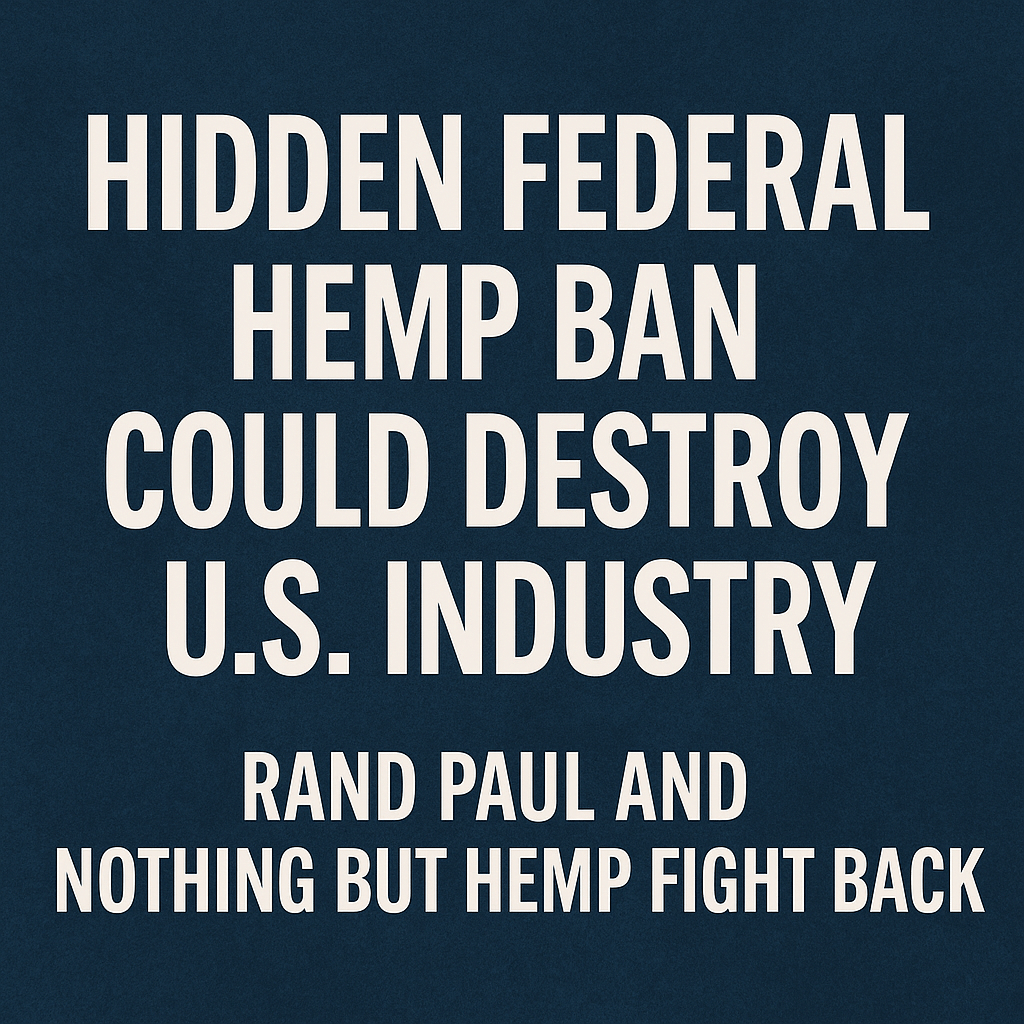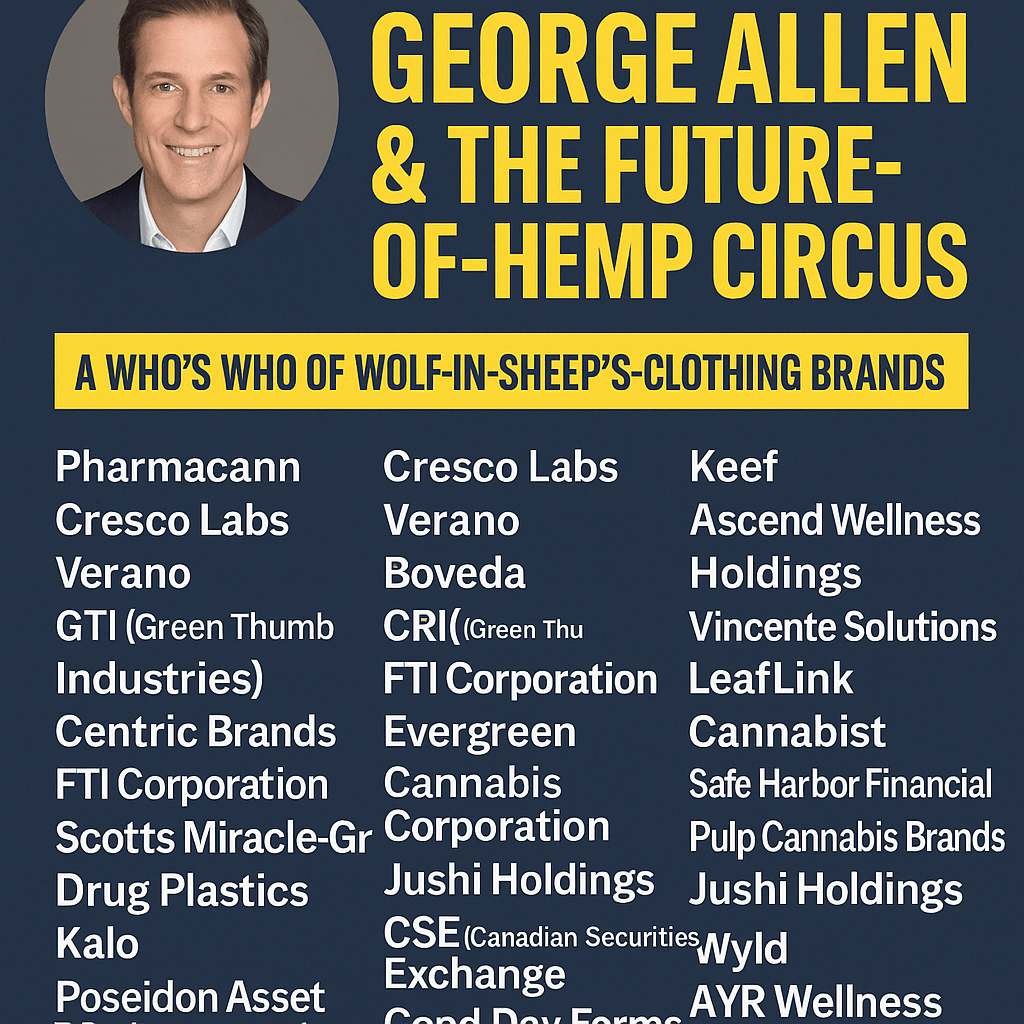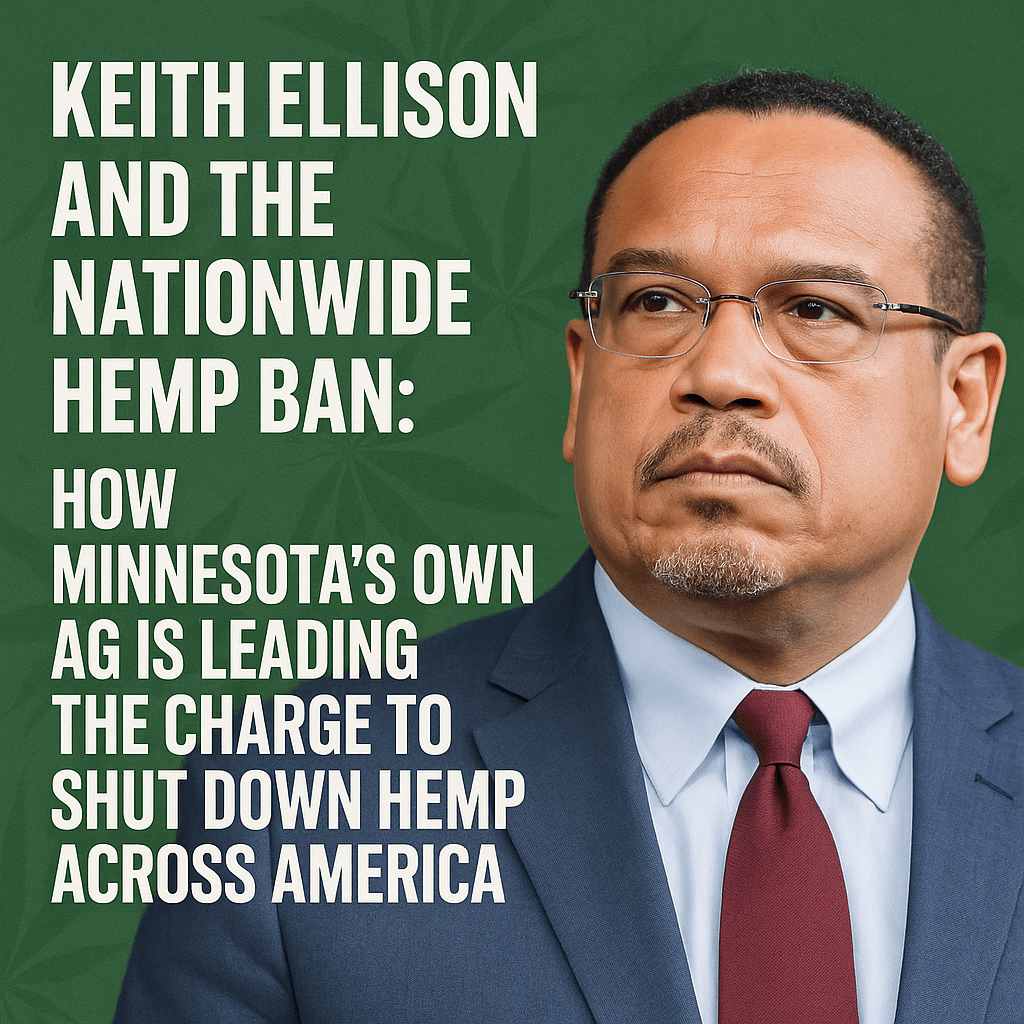Nothing But Hemp Joins Senator Rand Paul and Industry Leaders to Defend the Future of Hemp
Today, Nothing But Hemp joined an urgent national call with Senator Rand Paul and hemp industry leaders from across the country to address a growing crisis that could determine the future of hemp in America.
The discussion revealed that deep within Washington’s legislative process, certain lawmakers are quietly advancing language that could effectively outlaw hemp-derived products nationwide — by redefining what hemp is and slashing THC limits to unworkable levels.
Senator Paul didn’t hold back. He warned that these restrictions could be hidden inside massive appropriations bills and pushed through Congress within days using fast-track procedures that bypass public debate.
“This would be Armageddon for hemp,” Senator Paul said. “Almost nothing you see on the shelves today could survive these limits.”
The Hidden Hemp Ban: How Washington Plans to Kill an Industry
The biggest threat isn’t just the content of the proposal — it’s how it’s being moved.
According to policy insiders, federal hemp restrictions could be quietly inserted into large government funding packages, disguised among hundreds of unrelated items.
If Senate leadership uses unanimous consent to speed passage, the bills could clear both chambers in as little as one or two days. That means many lawmakers might never realize they’ve voted for a de facto hemp ban.
The proposed language would:
-
Redefine hemp from “0.3% Delta-9 THC” to “0.3% total THC,” capturing all natural THC variants, and
-
Impose a final-product THC limit of less than 0.2 milligrams per serving — a level so low that nearly every legal hemp product would become noncompliant.
If enacted, these rules would instantly eliminate 97–98% of hemp-derived products in the United States, including popular gummies, tinctures, and beverages.
Why This Threatens Every Corner of the Hemp Supply Chain
For hemp farmers, manufacturers, and retailers, this legislation would be catastrophic.
Farmers who have spent years developing compliant cultivars would face crop destruction. Manufacturers would have to abandon entire product lines, and retailers would lose nearly all inventory overnight.
A Virginia farmer on the call shared that he had to destroy five acres of hemp — a loss exceeding $1.2 million in retail value — after testing slightly above the 0.3% threshold. “If this new language passes,” he warned, “every farmer in America will face the same fate.”
A regional retailer employing over 400 people across the Southeast said that a federal ban would force the closure of all stores immediately.
And for Nothing But Hemp, a mid-sized business with 60 employees operating retail stores, online platforms, and distribution partnerships nationwide, the consequences would be devastating.
“If these restrictions go through,” a Nothing But Hemp representative said, “we would have to sell our home, lay off most of our staff, and close stores. This isn’t just a regulation issue — it’s a human issue.”
Hemp businesses like Nothing But Hemp represent the backbone of the American hemp economy: innovative, compliant, and deeply rooted in community. A federal ban would not only erase their livelihoods but also destabilize thousands of jobs across the supply chain — from farms to fulfillment centers.
The State-Federal Clash: When Washington Ignores Local Success
Equally troubling is how this proposal would override state laws that already regulate hemp responsibly.
For example, Kentucky allows hemp beverages with up to 5mg of THC, a model that supports both farmers and consumers. Under the new federal proposal, these same beverages would exceed the 0.2mg limit — and become federally illegal overnight.
Other states such as Minnesota, Tennessee, and Florida have enacted detailed hemp regulations, including strict age limits, packaging rules, and testing requirements. These frameworks have proven effective in protecting consumers and promoting fair competition.
Federal preemption would wipe out these successful systems, stripping states of their right to decide how to manage legal hemp commerce within their borders.
Senator Paul called this federal interference “a betrayal of the 2018 Farm Bill” — which was designed to empower states, not silence them.
FDA Inaction and a Policy Vacuum
Speakers on the call also addressed the FDA’s ongoing refusal to regulate CBD, which continues to block federal recognition of hemp as a true agricultural commodity.
Because the USDA defers to the FDA on policy matters, this inaction has prevented farmers from accessing federal grants and research funds that could sustain innovation in rural America.
One Kentucky grower said his state-approved grant application was denied at the federal level solely because it involved CBD — illustrating how bureaucratic limbo stifles growth.
Senator Paul argued that the solution is regulation, not elimination:
“The FDA’s failure shouldn’t become an excuse to destroy hemp. The government should be helping farmers and small businesses, not pulling the rug out from under them.”
Veterans and the Human Side of Hemp
One of the most powerful moments of the call came from a veterans’ advocate who shared that more than 160,000 veterans have died by suicide over the past two decades. Many veterans have turned to hemp-derived products for relief from pain, anxiety, and sleeplessness — often after traditional medications failed them.
Senator Paul underscored that these personal stories must lead the advocacy effort:
“Veterans, employees, parents — tell Congress what hemp means to you. When they hear the human side, they understand this isn’t about getting high; it’s about healing, jobs, and freedom.”
Hemp has become a lifeline for thousands of Americans seeking natural wellness solutions. Banning these products would not only devastate the economy — it would take away safe, effective options that improve quality of life.
Rand Paul’s Plan: Study, Don’t Ban
Instead of banning hemp, Senator Paul offered a reasonable, research-based plan that protects both consumers and businesses. His proposal calls for:
-
Raising the plant THC threshold to 1%, aligning U.S. standards with other agricultural nations;
-
Eliminating wasteful farm-level testing that punishes farmers for natural variations;
-
Testing only final consumable products to ensure public safety; and
-
Adding a non-binding USDA 18-month study to evaluate hemp’s market, safety, and regulatory needs before making permanent changes.
This path gives policymakers time to gather data and make informed decisions — without destroying an entire industry in the process.
“If Congress wants to study hemp, fine,” Paul said. “But don’t kill the industry before you understand it.”
Who’s Behind the Push — and Who Can Stop It
During the call, speakers identified Senator Mitch McConnell and Representative Andy Harris as leading advocates for the restrictive THC limits.
Meanwhile, Senator Jeanne Shaheen (D-NH) and Representative Sanford Bishop (D-GA) support a more measured approach, favoring a USDA study instead of new prohibitions.
Several key farm-state senators — John Thune (SD), Mike Rounds (SD), and John Hoven (ND) — were described as open-minded but uninformed. Their decisions will likely hinge on how many constituents speak up in the coming days.
As one organizer warned, “If they don’t hear from us now, they’ll just follow McConnell’s lead.”
A National Call to Action: What You Can Do Right Now
The message from today’s call was clear — every voice counts, and time is running out.
Here’s how you can help protect hemp and small businesses like Nothing But Hemp:
Call and email your U.S. senators and representatives.
Tell them how the proposed federal hemp restrictions would affect your job, your business, or your community.
Support Senator Rand Paul’s proposal for a USDA 18-month hemp study instead of new bans or arbitrary limits.
Share your story. Whether you’re a veteran, employee, consumer, or farmer — personal stories have far more influence than form letters.
Engage your network. Encourage employees, customers, and local business groups (like chambers of commerce and veterans’ organizations) to make calls and send emails.
Contact both Washington and local offices.
If you can’t reach D.C. staff, leave messages with state offices — every contact is logged.
Spread awareness in media.
Submit letters to local editors, post on social media, and share polling data showing that 72% of Americans support a safe, regulated hemp industry.
Nothing But Hemp’s Commitment to the Industry
As a mid-sized business employing 60 dedicated people, Nothing But Hemp has witnessed firsthand how hemp strengthens local economies, creates opportunity, and changes lives.
From our Minnesota headquarters to our retail and distribution partners nationwide, hemp is more than a product — it’s a movement built on wellness, sustainability, and personal freedom.
“We didn’t build this company to watch Washington erase it,” said the Nothing But Hemp team. “We built it to help people, support families, and create real American jobs.”
We stand firmly with Senator Rand Paul and the growing coalition of business owners, veterans, and consumers demanding fair and science-based regulation — not prohibition disguised as policy.
The Bigger Picture: Freedom, Fairness, and the Future of Hemp
At its core, this fight isn’t about THC numbers — it’s about freedom and fairness.
Millions of Americans use hemp-derived products not to get high, but to get healthy. The proposed restrictions ignore science, the will of voters, and the success of responsible state programs.
By equating hemp with marijuana, Congress risks punishing honest entrepreneurs while protecting corporate interests. Hemp represents innovation, rural development, and consumer choice — values every American should defend.
As Senator Paul said:
“We shouldn’t be criminalizing farmers and entrepreneurs for growing a plant Congress already legalized.”
The Bottom Line: The Fight for Hemp’s Future Starts Now
The next few days are critical. If the proposed hemp restrictions are passed quietly through appropriations, hundreds of thousands of jobs and billions in economic activity could vanish.
But there’s still hope. If the hemp community — business owners, employees, consumers, and veterans — unites and speaks up, we can protect the freedom to cultivate, sell, and enjoy hemp safely and responsibly.
Call to Action: Protect Hemp Today
Contact your senators and representatives immediately.
Ask them to support Senator Rand Paul’s USDA hemp study and oppose any federal hemp ban hidden in appropriations bills.
Together, we can protect hemp, defend small businesses, and preserve the livelihoods of families across America.







































